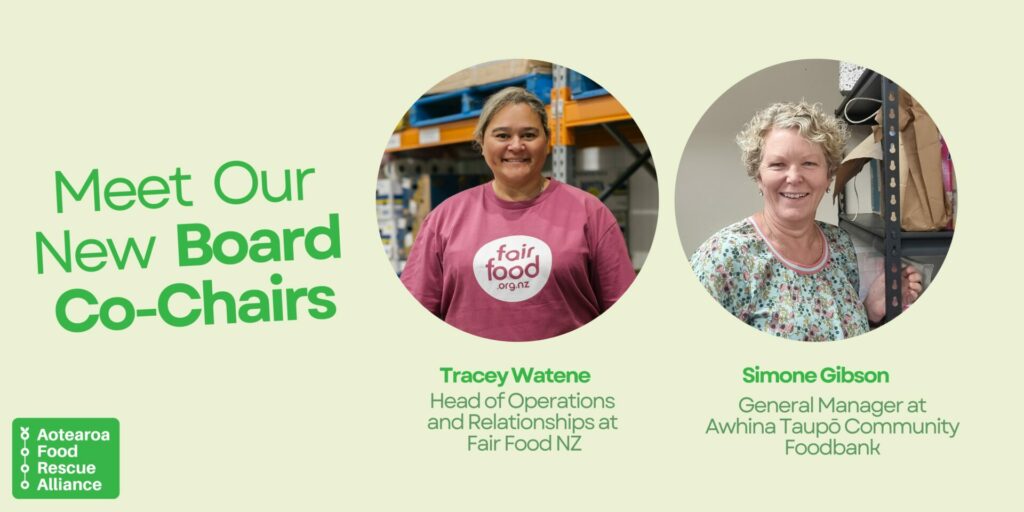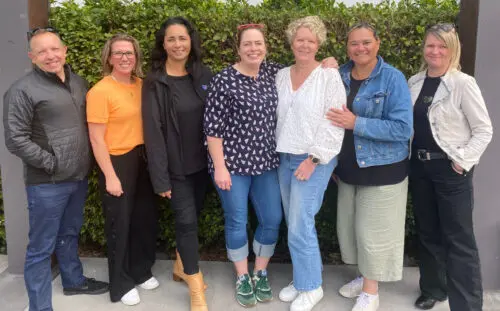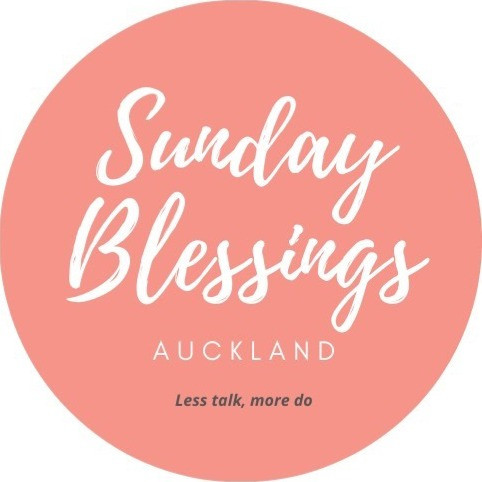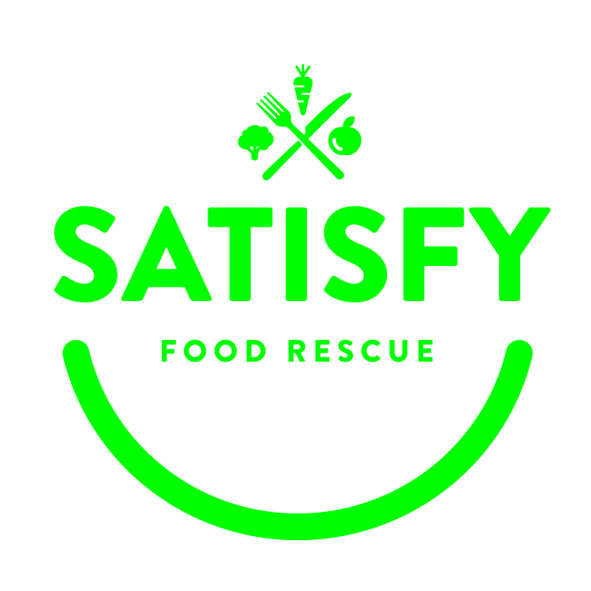Introducing Our Board Co-Chairs
We’re thrilled to introduce our dynamic new Board Co-Chairs, Tracey Watene, Head of Operations and Relationships at Fair Food NZ, and Simone Gibson, General Manager at Awhina Taupō Community Foodbank. They are both very familiar faces in the food rescue community and will be taking a collaborative approach to leadership, embodying our commitment to Te Tiriti and the principles of shared governance.

With deep roots in West Auckland, Tracey supports thousands of volunteers, numerous recipient groups, and key partnerships with supermarkets through her role at Fair Food. She has a background in Tertiary Education and Sports, where she has mentored rangatahi, and she currently serves as Vice President of the Tāmaki Makaurau Poitarawhiti Māori Women’s Welfare League.
Simone joined the food rescue sector in 2020 with Good Neighbour Aotearoa Trust in Tauranga before starting as General Manager at Awhina Taupō Community Foodbank earlier this year. Simone is passionate about collaboration, aiming to see AFRA members learn from each other, work together to raise the sector’s profile, and achieve sustainability for food rescue efforts across Aotearoa.
Simone and Tracey took some time to share their thoughts on food rescue, their motivations for joining the AFRA board, and their vision for our sector’s future.
Q: What inspired you to first get involved with food rescue?
Tracey: I’ve always felt a responsibility toward my community. Seeing the large amounts of food going to waste while many whānau struggled to put kai on the table inspired me to get involved. My connection to Te Ao Māori, and the values of manaakitanga (hospitality) and kaitiakitanga (guardianship), made it clear that food should be shared, not wasted. This drives me to contribute to a cause that addresses food insecurity while also honouring the mana of those we serve.
Simone: I started at Good Neighbour just two days before the Covid lockdown in 2020, with little idea of what food rescue was. However, I quickly became passionate about it after seeing its direct impact on the community, particularly as people were dealing with health challenges, job losses, isolation, and global uncertainty.
Q: What motivated you to join and now lead AFRA’s board?
Tracey: With the support of my board, I joined AFRA to amplify the impact of food rescue across Aotearoa. Having worked with community organisations, I saw this as a chance to contribute on a national level, drive systemic change, and embed Te Tiriti o Waitangi principles within the sector. I’m passionate about sustainable solutions that benefit both people and our environment, and AFRA’s vision aligns with these goals.
Simone: AFRA’s founders’ original vision —to bring together the best of all food rescue organisations, build capability, and provide a collective voice for the sector—was incredibly inspiring. Joining the board allowed me to contribute to this wider vision. It’s been amazing to see AFRA grow from 17 to 36 food rescue organisations, all of whom are hardworking and capable.

The AFRA Board (from left to right), David Savage, Stef Van Meer, Liz Cassidy-Canning,
Susie Robertson, Simone Gibson, Tracey Watene, Jennifer Stephens, (Kate Porter absent from photo).
Q: What are you looking forward to achieving as Co-Chair over the next year?
Tracey: I’m excited to strengthen collaboration between food rescue organisations across Aotearoa. One of my main goals is to enhance the integration of Te Tiriti o Waitangi principles into all aspects of AFRA’s work, ensuring that our efforts reflect true partnership with Māori communities.
Simone Gibson: After coming together for our two-day hui as a new board, we formed an aligned and enthusiastic team. I’m particularly excited about our Te Tiriti and Te Ao Māori project, which Tracey and Liz Cassidy-Canning will lead. This is timely and crucial work for our governance and for the wider AFRA community. I’m confident we’ll make significant progress on this and other projects in the next year.
Q: What would success look like for AFRA five years from now?
Tracey: Success would mean a strong, nationwide network of food rescue organisations working seamlessly to reduce food waste and hunger across Aotearoa. I’d like to see AFRA set high standards for sustainability and community engagement while building strong partnerships with government, businesses, and iwi to secure ongoing support. Embedding Te Tiriti o Waitangi principles into everything we do would be a key marker of success.
Simone: In five years, I hope AFRA members will have long-term, secure funding to continue their work on the ground. I’d like to see the food rescue model recognised as the best solution for diverting food from landfill while providing kai to our communities. Our data should also clearly demonstrate the sector’s impact and its contribution to our partners’ sustainability goals.
Q: What advice would you give to someone who wants to support food rescue but doesn’t know where to start?
Tracey: Connect with your local food rescue organisation and explore how you can help. Whether it’s volunteering to sort and distribute food, offering skills like logistics or fundraising, or even making small donations, every action counts. Even in your own whare, you can make a difference by reducing food waste.
Simone: Whanaungatanga is key—reach out to any food rescue organisation, and they’ll share their local challenges and impact with you. Volunteering is a great way to get hands-on experience. Also, be open to learning from others. Food rescue organisations come in all shapes and sizes, and there’s always something to learn or improve upon.
We also want to take a moment to extend our heartfelt gratitude to Stu Ennor, our outgoing Chair, for his invaluable contributions and dedication to AFRA. His leadership has laid a strong foundation for our work, and his unwavering commitment to food rescue has inspired us all.
As we move forward under the guidance of Tracey and Simone, we’re filled with optimism for the future and look forward to amplifying our impact in the food rescue sector.






